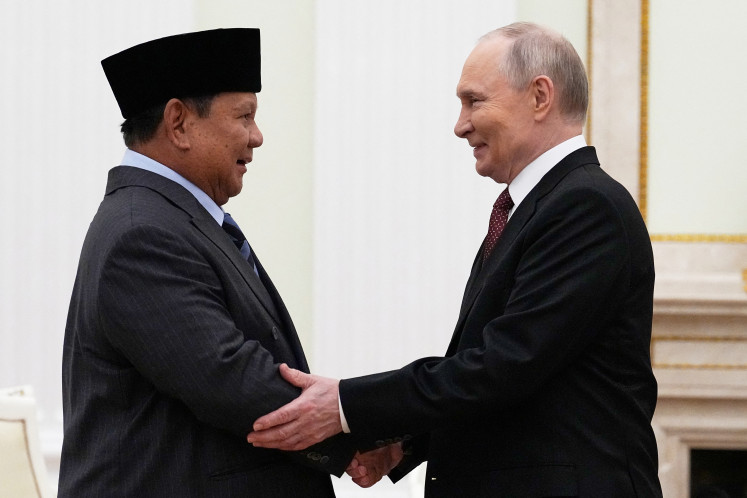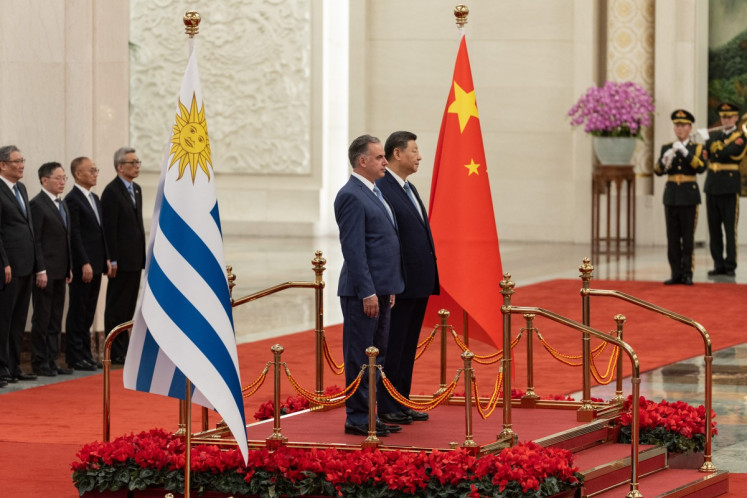Popular Reads
Top Results
Can't find what you're looking for?
View all search resultsPopular Reads
Top Results
Can't find what you're looking for?
View all search resultsMediating in a broken world: How Indonesia can make a difference
Indonesia’s "free and active" foreign policy, its laissez-faire mediation style as well as its cumulative experience, from the national revolution to the post-tsunami Aceh peace process, might succeed in helping to resolve geopolitical conflicts in Southeast Asia as well as the Middle East amid the global breakdown in the rules-based order.
Change text size
Gift Premium Articles
to Anyone
 President Prabowo Subianto (second left) stands among other world leaders (from left) Paraguayan President Santiago Peña, United States President Donald Trump Cypriot President Nikos Christodoulides and Hungarian Prime Minister Viktor Orbán as they gather for a photo op on Oct. 13 during the 2025 Gaza Peace Summit, also known as the Sharm el-Sheikh summit after the Egyptian city that hosted the event. (AFP/Pool/Suzanne Plunkett)
President Prabowo Subianto (second left) stands among other world leaders (from left) Paraguayan President Santiago Peña, United States President Donald Trump Cypriot President Nikos Christodoulides and Hungarian Prime Minister Viktor Orbán as they gather for a photo op on Oct. 13 during the 2025 Gaza Peace Summit, also known as the Sharm el-Sheikh summit after the Egyptian city that hosted the event. (AFP/Pool/Suzanne Plunkett)
I
t might seem strange to propose that Indonesia take up the burden of forging peace in today’s broken world. But then, Indonesia’s very existence seemed improbable enough. Against considerable odds, Indonesia fought a war of independence against the Dutch and persuaded the wider world to support its quest for freedom.
Not content with winning independence, Indonesia went on to propose bold initiatives and ideas for the emerging postcolonial order. The Asia-Africa Conference convened by president Sukarno in Bandung in 1955 brought together, for the first time, all the newly emerging states and urged a new solidarity. It was a cathartic event that seeded collective groupings of states in Africa and helped define new norms and values governing peace and security at the United Nations.
Ever since then, Indonesian foreign policy has strived to contribute to regional and global peace and security, often using the tools of mediation and dialogue. This is the true meaning of “bebas dan aktif” (free and active), with an emphasis on the “active” part.
This was not always easy. There was the contradiction of Indonesia’s own expansionist policy of confrontation in the 1960s, followed by several messy internal conflicts that saw the use of military force to suppress bids for autonomy and abuse human rights. The country’s anti-communist Cold War stance through the 1970s and 1980s was at odds with the nonaligned ethos framed in Bandung.
But these experiences also helped Indonesia understand the nature and the value of peacemaking. In the 1980s and ‘90s, it led mediation efforts to bring peace to civil war-wracked Cambodia and father a ceasefire in the Philippines’ Muslim Mindanao. Having submitted to international mediation efforts that settled the long-running conflict in Aceh, it offered to help settle conflicts in Afghanistan and Myanmar.
Indonesia’s style of mediation is essentially to offer a space to convene conflict parties and facilitate lightly. This sometimes gives the impression of not being all that serious or committed. “Indonesia is too slow,” is what I hear from Middle Eastern interlocutors eager for Indonesia to be more proactive on the issue of Palestine. This reflects a cultural predilection for politeness and an assumption of good intentions.
Arguably, the time for politeness is over today.


















